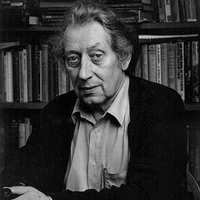A Polished Performance by Dennis Joseph Enright: Summary
Citizens of the polished (fashionable) capital sigh for the sub-urban pits (villages) and their innocent simplicity. The people of the sub-urban parts appreciate the unpolished (unfashionable) innocence of the distant villages. Dwellers in the distant villages speak of a simple, unspoilt girl, living alone, deep in the bush. Deep in the bush we found her.

Dennis Joseph Enright
She had large and innocent eyes. She lived among gentle gibbons (long armed ape of South East Asia) and mountain ferns (type of flowerless plant with feathery green leaves). She was perfect for the part of the country except for the dropsy (disease in which watery fluid collects in the body) which comes from polished rice imported from the polished capital. In the capital, our film is much admired for its gentle gibbons and mountain ferns, and for the; unspoilt, unpolished, large and innocent eye or the girl.
The poem "A Polished Performance" is about the performance of 'art' itself -- whether that is a romantic poem eulogizing (praising) the beauty and purity of the rural life or a dramatized version of a film. The poem is satiric to some extent, but it embodies many different levels of meaning. "Polished" is the central word of the poem giving it an ironic context of meaning. The poem begins with a reference to the "citizens of the polished capital. They are the modern people of the large, sophisticated, modernized or commercialized city. They sigh for the towns up country. They long for the simple touch of life in the village, and for its innocence and simplicity.
Still more, there is the same unfulfilled wish of the people wherever one goes. The people of the towns up-country, they praise the unpolished innocence, simplicity of manner and living in the distant villages.
If one visits such distant villages, the villagers there, in the same way, speak of a simple and unspoilt girl living alone at the heart of the jungle.
Now the perspective of the poem changes. A shift from the present time to the narrative past is what is seen here. Now the speaker and other friends "found” her “deep in the bush". The girl had "large and innocent eyes. She was among the gentle apes and mountain plants.
The girl was perfect “for the part.” We now understand that the speaker is one of the filmmakers who have long tried to find a girl for the innocent role of the film. The girl was "perfect” for the role of the documentary version of the film. Yet the girl was suffering from "dropsy”, the abnormal swelling of the limbs and the body. She suffered from this deficiency disease because of the "polished rice" she ate. Here, the poem makes the-point that human beings are dissatisfied with their living conditions. The people wish to go 'elsewhere or 'somewhere' for better living or better tomorrow. But, the search of the ideal is never fulfilled. Ideal is the thing of the mind. In the real life situation there are defects in one form or the other.
The speaker asserts in the last stanza that their film was much admired in the capital. People liked the way the gentle apes (gibbons) and mountain plants (ferns) were pictured. They also praised the girl who they thought was unspoilt, unpolished, large and of innocent eyes. Again, the poem makes another point that purity and innocence are the things very much aspired in life. But in art the seamy side (here the dropsy deformity) is often hidden. Only the carefully framed polished things are projected. Life is not always polished and joyous. Art here hides the reality and gives simply an illusion of the ideal life. Briefly, the poem makes such points:
- Human beings are never satisfied: they always wish themselves in circumstances which they hope will be better than the ones they are actually in.
- The life in the polished capital is rather an unhappy one. The people here have the experience of the emptiness of the excitement and pleasure of the affluent city. So they wish something uncomplicated and simpler. Thus the poem is 'written from the perspective of the city dwellers.
- The ideal type of beauty is very hard to find. The ugly aspects are too often hidden and the beautiful surface is projected in the film version.
- Simple, unspoilt existence has its cost. No doubt the girl lives an unsophisticated unpolished existence. Yet she suffers from the disease related to poverty, restricted living condition, unvaried diet, and ignorance. Her disease comes from the "polished" diet.
- The poem also makes the contrast between the different ways and standards of city life and rural life.
The poem is cast in an ironic way. It makes a commentary that the so-called unspoilt, natural life has its own cost and dangers. The poem does not employ so much of figures of speech. It works through bare statements Ironic device is soon caught. The economy and controlled expression match perfectly with the kind of idea it presents. The poem develops logically and the poet shows to us the defects of the polished performance of the sort he talks in the poem.
A Polished Performance by Dennis Joseph Enright: Poem
Citizens of the polished capital
Sigh for the towns up country,
And their innocent simplicity.
People in the towns up country
Applaud the unpolished innocence
Of the distant villages.
Dwellers in the distant villages
Speak of a simple unspoilt girl,
Living alone, deep in the bush.
Deep in the bush we found her,
Large and innocent of eye,
Among gentle gibbons and mountain ferns.
Perfect for the part, perfect,
Except for the dropsy
Which comes from polished rice.
In the capital our film is much admired,
Its gentle gibbons and mountain ferns,
Unspoilt, unpolished, large and innocent of eye.
Literary Spotlight
Literary Appreciation of A Polished Performance
Critical Appreciation of A Polished Performance
Biography of Dennis Joseph Enright
 |
bachelorandmaster.com |